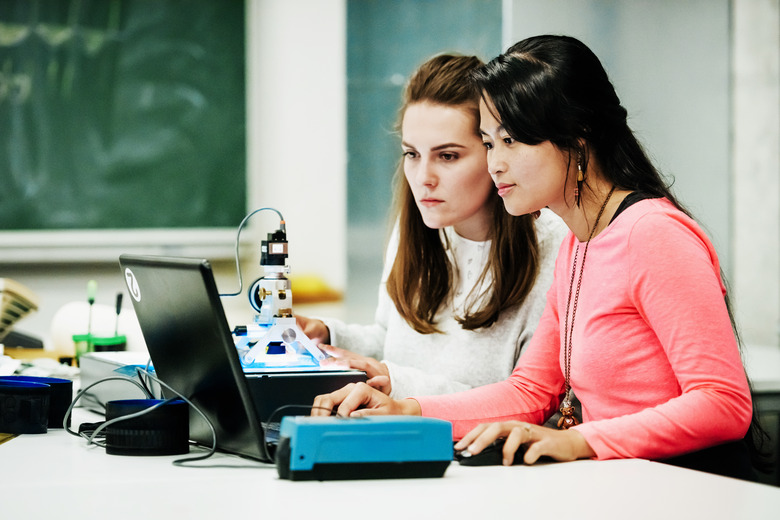How To Come Up With A Killer Science Fair Project Idea
A new year is upon us! That means it's time for New Year's resolutions, fresh starts and new semesters.
It also means that it's science fair season.
Now's the time of year when many students are tasked with not only coming up with an original science fair project idea, but also understanding what their hypothesis is, creating an experiment to test it and evaluating the results of to reach a scientific conclusion.
That's no easy task. Before you can get started on the meat of the project (creating and performing the experiments) you need an original and interesting idea. Here are a few things to keep in mind as you begin to brainstorm.
Think About Your Passions
Think About Your Passions
If there's one thing that makes any school project a lot easier to handle, it's doing something that you actually enjoy. Even if science isn't your favorite subject, almost any passion can become an amazing science fair idea.
You love music? You could look into how different music affects the way people study.
Are you an athlete? You could examine how different shoes affect how fast people can sprint, or how long it takes to run a mile.
Love plants and animals? Look into how the temperature of a room affects insect activity, or how different fertilizers affect the speed at which certain seeds sprout.
As you can see, almost anything can turn into a great science experiment. Take some time to think about the things you're most passionate about to help narrow down your options and ensure you pick something you care about.
Do Some Research
Do Some Research
After you've decided on a general passion or interest that you want to explore, it's time to do some research.
The internet is a wonderful resource full of project ideas and inspirations, and it's a great place to start. Look up other people's ideas or experiments that are related to your interest. This doesn't mean copy other ideas or projects, but it can help get your gears turning and see how people turn their interests into science fair projects.
Don't limit yourself to researching other science fair projects, either. Professional science experiments and scientific papers are also a great resource that explain methods, background and discussion that can help you during this brainstorming phase of your own project.
Use the Scientific Method
Use the Scientific Method
The scientific method should be the backbone of the project you choose. Not only that, but you can actually use the scientific method to help you figure out what your project & experiment will look like.
1. Observation stage: based on your observations, formulate a question
Think back to your "passion" brainstorm. Let's say you chose your plants. Take the time to observe plants and brainstorm questions those observations elicit.
You see that some seeds grow better in the sun vs. the shade. How much sun is too much sun? How much shade is too much? What other variables could affect the growth of a plant? Temperature? Water? Soil?
Once you've taken the time to think through these things, formulate a single question that will become the backbone of your project. This is the question you'll aim to answer with your project.
As with the general topic, make sure your question is something you're interested in.
2. Formulate your hypothesis
A hypothesis acts as your prediction to the question you're asking. Think back to the music example from earlier. Let's say your question is, "Do different genres of music affect a student's focus?"
A potential hypothesis could be, "Students will focus better with music without lyrics compared to music with lyrics."
In choosing a topic that you're interested in, you probably already have an opinion on the question you're asking. Use your specific perspective or knowledge to formulate your hypothesis to ensure your project is both unique and interesting to you.
3. Create an experiment to test the hypothesis
Here comes the hard part. Thinking about your experiment during the brainstorming phase will save you a lot of trouble later on, since it can affect the hypothesis, question and overall topic you choose.
For example, you could be very interested in microbiology and want to have your project focused on that subject. It would be nice to explore in-depth questions about a certain type of bacteria's biochemistry, but is that going to be feasible in your time frame? Do you have the materials or resources to create and perform that type of experiment?
Coming up with a killer project idea can be exciting and stimulate your imagination. Thinking ahead to the actual experiment phase, though, can help you create a more realistic idea that you'll be able to complete in the timeframe you have and with the resources you're given.
Talk About It
Talk About It
Talking through your ideas and interests with others is a great resources. They'll often have different perspectives and help you work through your general thoughts and ideas to create an awesome project.
Your teachers are going to be extra helpful since they're the ones grading and evaluating your work. They can also help give you inspiration from past projects and help you apply what they're teaching in class to the project itself.
Cite This Article
MLA
Walsh, Elliot. "How To Come Up With A Killer Science Fair Project Idea" sciencing.com, https://www.sciencing.com/how-to-brainstorm-for-a-science-fair-13724224/. 29 January 2020.
APA
Walsh, Elliot. (2020, January 29). How To Come Up With A Killer Science Fair Project Idea. sciencing.com. Retrieved from https://www.sciencing.com/how-to-brainstorm-for-a-science-fair-13724224/
Chicago
Walsh, Elliot. How To Come Up With A Killer Science Fair Project Idea last modified August 30, 2022. https://www.sciencing.com/how-to-brainstorm-for-a-science-fair-13724224/
